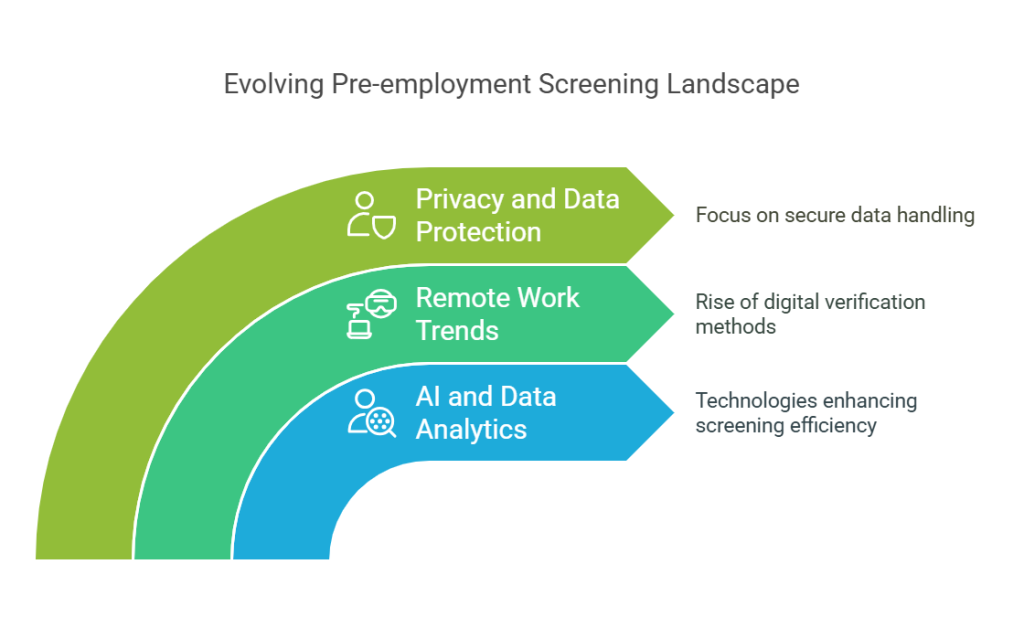Navigating the job market in New York can be challenging, especially with the complexities of pre-employment screening processes. As employers seek to hire qualified and trustworthy candidates, these screenings offer a crucial way to assess potential employees. For job seekers, understanding what these screens entail can make the process feel less daunting.
This guide provides accurate, up-to-date information, answering common questions and offering insights about pre-employment screening in New York. We'll cover background check essentials, legal considerations, and resources to assist both employers and job seekers.
Key Takeaways
- Pre-employment screening in New York involves background checks, drug testing, and reference checks to evaluate a candidate's fit for a job.
- Background checks are crucial for verifying applicant information and identifying potential risks that could affect workplace safety.
- New York's legal framework, including the Fair Credit Reporting Act and the Fair Chance Act, regulates how employers conduct pre-employment screenings to protect candidate rights.
- Job seekers with a criminal record should understand their rights under New York law and prepare to discuss their history during the hiring process.
- Emerging trends in pre-employment screening include the use of artificial intelligence and digital verification methods, especially with the rise of remote work.
What is Pre-employment Screening in New York?
Pre-employment screening in New York is all about making sure a candidate is the right fit for a job. This typically involves several checks and evaluations to confirm credentials and assess the person’s background. Here's what the typical process includes:
- Background Checks: This step delves into a candidate's criminal, financial, and employment history to ensure everything checks out. Employers want to make sure that the person they're hiring has a clean record or at least is upfront about any past issues.
- Drug Testing: Many jobs require candidates to undergo drug testing to comply with health and safety standards. This ensures that employees can perform their duties safely and effectively without substance-related impairments.
- Reference Checks: Contacting previous employers is common practice to verify past job performance and employment history. This involves speaking with former supervisors or colleagues to confirm details like job titles, responsibilities, and work ethic.
This series of evaluations forms the backbone of the pre-employment screening process in New York, helping employers make informed hiring decisions and maintain a trustworthy workplace environment.
Importance of Background Checks
Why They Matter
Background checks hold a significant place in the hiring process, primarily ensuring that workplaces remain safe and free from fraud. For employers, these checks serve as an essential tool:
- Verify Applicant Information: Background checks allow employers to cross-check the accuracy of the information provided by candidates. This includes verifying education credentials, employment history, and other relevant qualifications. Accurate applicant information is crucial for building a trustworthy workforce. Employers can confidently onboard new hires, knowing their credentials are verified.
- Assess Risk: They help identify any potential red flags, such as past criminal activities or financial discrepancies, that could pose risks to the organization. Knowing a candidate's history aids in making informed hiring decisions. These risk assessments not only protect the organization's assets but also its reputation. By identifying potential threats early, companies can avert potential internal issues before they arise.
A 2022 survey by HR.com found that 93% of organizations implement background screening, underscoring the widespread reliance on these checks. Such widespread adoption reflects the integral role background checks play in today's employment landscape. With so much at stake, both for employer and employee, comprehending the ins and outs of background checks can lead to more secure, informed decisions.
EXPERT INSIGHT: In this modern era, with AI ubiquitous, candidates can easily craft and refine resumes and CVs using AI tools, showcasing their skills and competencies. However, this convenience presents a challenge for employers: the risk of these resumes featuring fabricated accomplishments rather than genuine experiences. While interviews—whether in-person or virtual—are valuable, background checks provide much more. It's no surprise that background checks are a widespread practice in New York to ensure they hire the right fit for their open positions. - Emile Garcia, SHRM-SCP, CHRP, CHRBP
Legal Framework in New York
Compliance and Regulation
New York has specific laws surrounding pre-employment screening that employers must follow. The Fair Credit Reporting Act (FCRA) is a federal law that sets the groundwork, requiring employers to obtain written consent from candidates before conducting background checks and ensuring applicants receive a copy of their report if any adverse action is taken based on its findings. Additionally, New York’s Human Rights Law plays a significant role by preventing discrimination based on criminal history unless there's a direct connection between the nature of the crime and the job.
Bear in mind that New York City has even stricter regulations under the Fair Chance Act, which limits inquiries into a candidate's criminal history until after a conditional job offer is made. These laws ensure a fair hiring process, emphasizing transparency and equal opportunity for all applicants.
Employers must navigate these legal requirements carefully to avoid penalties and uphold candidates' rights. Resources like the Equal Employment Opportunity Commission (EEOC) provide guidance on these regulations, making it crucial for employers and job seekers to familiarize themselves with these laws to ensure compliance and maintain fair employment practices.
Resources and Support
When it comes to background check preparation, it's useful to explore a range of resources that can guide you through what to expect. Many online platforms and community groups offer articles, workshops, and forums where you can learn from the experiences of others who have gone through the pre-employment screening process.
For further reading, check out the GCheck Blog, which provides a variety of articles focusing on different aspects of background checks. The blog covers everything from understanding your rights to practical tips on handling challenging checks.
Statistics and Data
Numbers make things clearer. In New York, around 95% of employers conduct background checks, not just the big corporations. This shows how these screenings have become standard hiring practice. A report by the Society for Human Resource Management found that 85% of employers discovered a fraudulent detail on a resume at least once, underlining the checks’ role in maintaining workplace honesty.
For job seekers, knowing these stats can level the playing field. Surveys show that 45% of applicants feel anxious about these screenings. Understanding that many employers are just verifying, not snooping, can help ease this anxiety.
On the employer side, data reveals safety benefits. Businesses that run background checks report fewer incidents of workplace violence. This is no minor point when you consider how vital safety is for maintaining a productive working environment. Emphasizing safety, nearly 70% of these businesses saw improvements in employee retention, linking thorough screening with a stable workforce.
These numbers aren't just figures; they are part of a broader conversation about trust and transparency in hiring. For both sides, understanding these trends is a way to prepare better for the journey ahead.
Future Trends in Pre-employment Screening
As technology continues to evolve, so do pre-employment screening practices. Employers and job seekers in New York are beginning to see changes spurred by advancements in artificial intelligence and data analytics. These technologies promise to streamline the screening process, making it faster and potentially more accurate. Automation reduces the time it takes to complete background checks, yet it's important for employers to ensure that these systems do not introduce bias or errors.
Remote work trends have also prompted shifts in how screenings are conducted. With more companies hiring remote employees, there's an increasing need for digital verification methods. This shift may lead to a rise in online identity checks and virtual interviews.
Moreover, the focus on privacy and data protection will likely intensify as laws and regulations catch up with technological capabilities. Both employers and candidates should remain vigilant about how personal data is handled during the screening process to prevent breaches and misuse.

As the landscape continues to adapt, staying updated on these trends can help both sides of the hiring equation make informed decisions, ensuring a smooth and secure hiring process.
Frequently Asked Questions (FAQs)
What if I have a criminal record in New York?
In New York, employers can't simply reject a candidate due to a criminal record. They need to consider if the conviction is relevant to the job at hand, taking into account factors such as the seriousness of the offense and the length of time since it occurred. The state's Human Rights Law offers some protections here, so it's important to be forthcoming and ready to discuss your history, highlighting your rehabilitation when possible.
How can I prepare for a background check in New York?
Before applying, double-check the accuracy of all information on your application. Discrepancies can raise red flags, so being consistent and honest is your best policy. You might want to obtain your own background check in advance to see what an employer might uncover. This allows you to prepare explanations for any issues that could arise, helping you address them confidently if asked.

GCheck Editorial Team
Meet the GCheck Editorial Team, your trusted source for insightful and up-to-date information in the world of employment background checks. Committed to delivering the latest trends, best practices, and industry insights, our team is dedicated to keeping you informed.
With a passion for ensuring accuracy, compliance, and efficiency in background screening, we are your go-to experts in the field. Stay tuned for our comprehensive articles, guides, and analysis, designed to empower businesses and individuals with the knowledge they need to make informed decisions.
At GCheck, we're here to guide you through the complexities of background checks, every step of the way.






